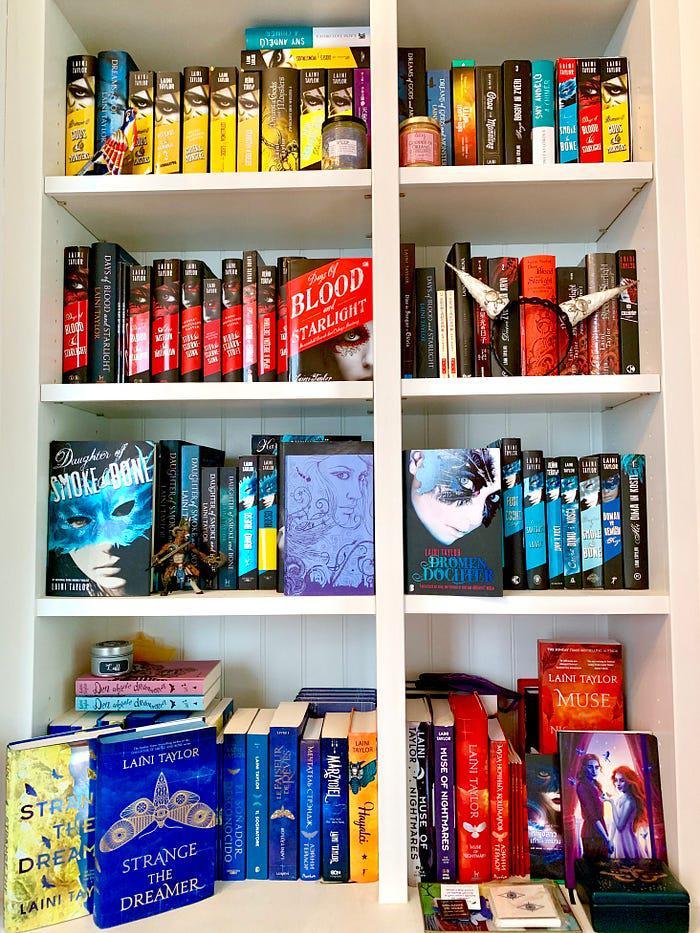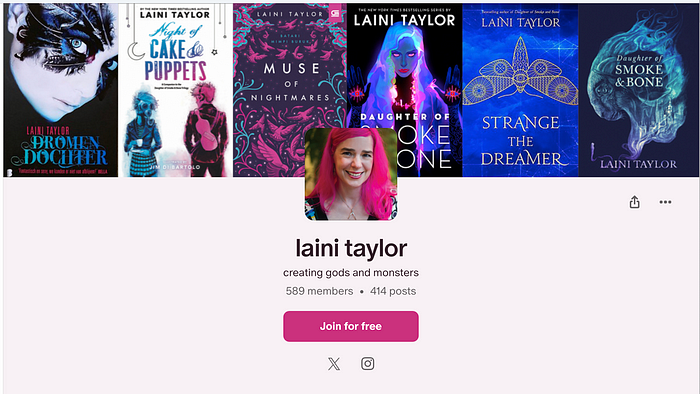I speak openly about all aspects of my writing life, from the process to the publishing journey. What I want to share here is the extent to which I trust an intentional practice of playful writing exercises for my career.

Playful is not what I had a foot in the door. I wrote my first two books in an old-fashioned way, which can best be described by interpreting the old saying of the Fowler gene, you know?
I stared at a blank screen until the blood droplets formed on my forehead.
Ha ha, no actual blood could be, but you get the idea. In my memory, those years are a hazy fog, with my desire to do this having to daily overcome the temptation to just imagine it, and my main source of motivation was an incredible disgust with myself for not doing it. It had to become truly more painful to not write than to write. I hate that’s what it cost, but I got there. After more than 30 years of wanting nothing more than to be a writer, I completed my first novel. It received some offers and was sold quite uniquely to a major publisher 5, along with its sequel, which was also a traditional forehead book (even more so, as is often the case with second books). But:
My feet! Are here! The door!
Just not very safe, as it popped out. That Big-5 publisher neglected to inform the public that my books existed (to be honest, they had a job) and they did not become the phenomenon I had envisioned in my imaginings. The sequel never even appeared in paperback, and that’s a small part of my heart that I will never get back. It was an inevitable launch. Those books still have their cheerleaders out there (and I love you so much, so much), but more commonly, readers think my fourth book is my first book. Because my fourth book? My fourth book is a dream.
Daughter of Smoke & Bone was auctioned (to another major publisher 5) for a jumping and slowing amount. House money. Life-changing money. I learned that journalists are one thing that publishers have, and so do marketing departments. Who knew?! Within a year, all my writer dreams came true, along with others I didn’t know to dream. Themed launch parties, book tours in several countries, media, foreign editions, fan art, works. A little later, tattoos, pets, and babies of readers named after characters appeared, bestsellers, international book festivals, deluxe special editions, etc.
(This is part of my foreign edition collection.)

The experience is night and day from my first book deal, but the truth is the important thing is: the difference began long before it sold. They were woven into its roots from the earliest beginnings, and even before that, when it hadn’t yet sparkled in my eyes. Because I didn’t write it how I wrote the first two. Daughter of Smoke & Bone is not a blood forehead book. Nor is my third book, which paved the way for it (I’ll explain in a minute). No need for disgusting motivation. Were they fun?
(Wait. Can writing be fun?!)
(Yes! It can!)
Sure, there was struggle. My brain produced it: The struggle of small craft battles, only the best organic ingredients. A large portion of my creative energy was spent guiding my brain out of the maze of its own invention. (Oh, Brain.) But with these books, the mazes took me to wonderful places. The struggle was secondary, often completely absent, and I began to experience, for the first time, the states of grace that other writers had spoken of and I had doubted truly existed. You know: when characters take over. When the story tells itself. When the words seem to come, through you, not from you. When you forget you even wrote and lose yourself in the flow. These things had never happened to me before, and now they did (not always, not reliably, but they happened) and it made the text not only more fun but also better. Cooler. Weirder. Deeper. Honest. And it changed my life.
So what happened? I’m so glad you asked!
First, it didn’t just happen. I made it happen, and I emphasize this not as a self-pat on the back but to say: You can do it too. If your handkerchief budget is through the roof from wiping your blood-soaked forehead, and you think people are lying to make you feel bad when they say their characters took over, and you want to write, but also have to write? Change is possible.
Here’s what I did, back in 2006, little imagining its impact:
I cultivated a non-goal-oriented writing practice, building a small community around it and learning to play.
Time-wise, I had sold that first novel and was waiting for my first editorial letter. I had a sequel to write but couldn’t face it. I was mentally exhausted (bleeding from the forehead is tiring), and, while waiting for feedback, didn’t know how much could change. In the two years I wrote that book, I wrote nothing else, and I wanted to. I longed to be more prolific, and I longed to enjoy it.
Those were my goals:
- Write more.
- Enjoy it more.
This was in the golden blog days of the Mid-aughts, and I had a blog. It was a very different time on social media, before short-form platforms took over. People commented generously, it was very personal and communities formed - all of which also happens on IG and Twitter, but it was different: deeper and more intimate. . A website with a blog friend, I had a community ready to jump in and play with me. I made a habit of spending Sunday mornings writing these pieces and sometimes would go all day.
I want to be clear that my hopes were modest: write more. Enjoy it more. That’s it. No voice in the back of my head whispering, play your cards right and this could lead to the books that will change your life. If there had been, that would have killed it. Everything that happened was a beautiful surprise, and looking back from here, I can see why it worked. Two main parts of this non-goal-oriented writing practice are:
- A practice: also known as forming a habit.
When you do something regularly over a period of time, you change your brain, rewiring neurons into new neural pathways - like dedicated highways - making the behavior easier and more natural. As someone who struggles to start, to not overturn, not get bogged down in loops of revision, the simple neuroscience of habit made it increasingly easier for me to access a creative space more effectively. I learned to trust the process, relax, and have fun.
- I’m not goal-oriented: This is very important to me: that I started without expectations, in a spirit of pure exploration.
Have you ever dreamed of a story and been so excited to start writing it only to find, when you do, that what you’re really building is one word at a time, so the whole experience feels like failure instead of creation?
NO? Um, well, yes, I have too.
Ha ha, really, I have. The biggest source of my struggle is perfectionism. And not, like, the lovely perfectionism you humbly aspire to, but the perfectionism of perfection, nothing-nothing to control, uncontrolled, driving a spiral of endless rewriting. It’s really hard to write through that kind of brain music, and so much of the hazy fog of struggle, the years finishing my first novel were spent brutally continuing on.
But what I learned from timely writing is that my perfectionism told me I would be lacking if I had no goals to lack. You can’t get lost if you don’t care where you’re going and you can’t fail if you don’t care what you’re doing! Ha. It’s a simple hack, but I was so magical approaching the page with a simple word or phrase, no expectations and no gilded-framed portrait of the book to pursue the inevitable disappointment.
Pretty much immediately, I started having fun. The results were interesting, surprising, and alive—mostly fragments, but some almost had story shapes. Pretty much all of them felt like windows I could choose to open or not, with a whole sparkling world just out of sight. How wonderful! Things happen when you start writing! I trusted that I could sit down with a notebook, a pen, and a prompt, and, in a paragraph, get swept into a scene or situation that would never exist and that thrilled me. All without a drop of blood. Win!
I incorporated other exercises into the practice, my imagination grew, and my relationship with my own creativity improved massively. Within a few months, I expanded some quick works into short stories. Each felt like a gift falling out of a dream. One was published in an anthology, my first! Some others fit together around a loose theme, and I thought about sending them to magazines.
They could be a book, my husband said.
And they became a book - my third. It was sold to another major publisher, my husband illustrated it (it’s wonderful), it was selected for a prestigious Buzz Buzz panel at the Book Expo, and received good attention. And then…
.
A few weeks after my daughter was born, my husband interrupted me to whisper, mysteriously, that it was the National Book Award? "On the phone. I turned off the water and took the call, dripping, not knowing what it was. Well, that book—a trilogy of stories inspired by the quickness I had written for fun, feeling like gifts falling from dreams—was shortlisted for the National Book Award.
That’s what I want to say about it paving the way for my fourth book and all the glorious things that followed. Being shortlisted for the National Book Award doesn’t sell books, but it made editors aware of me at the moment I was writing my next book, and set the stage for that life-changing auction.
This is getting long, so I’ll save the details of Daughter of Smoke & Bone for my next post. It’s also the fruit of the writing practice, though in a different way, less directly and surprisingly making for an even better argument to play. I can’t emphasize enough that prioritizing fun in writing has exceeded my wildest dreams and is entirely responsible for my career.
Xo
[This is a shortened version of a longer piece on my Patreon, where there are many writing, publishing, and process exercises.]

Laini Taylor is a New York Times bestselling author and the Sunday of The Daughter of Smoke and Bone Trilogy, The Strange the Dreamer Duology, and other books. She has been translated into over thirty languages, shortlisted for the National Book Award, and received a Printz honor. You can find more about writing, as well as a warm and vibrant community of writers at all stages, at her Patreon and Discord, where she meets with members on Zoom each week.
